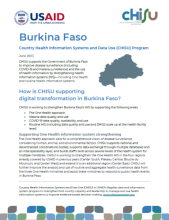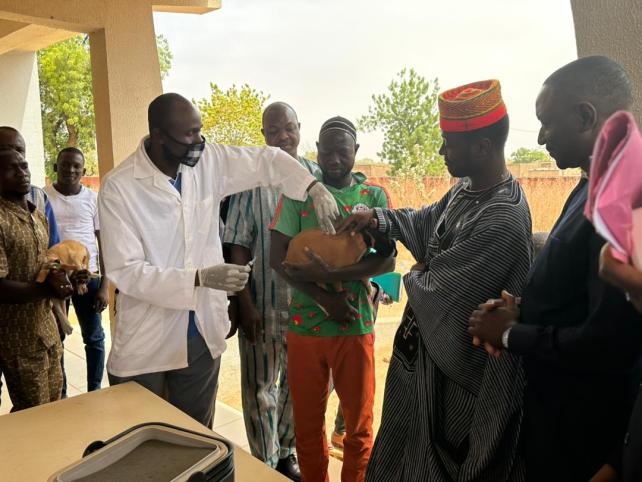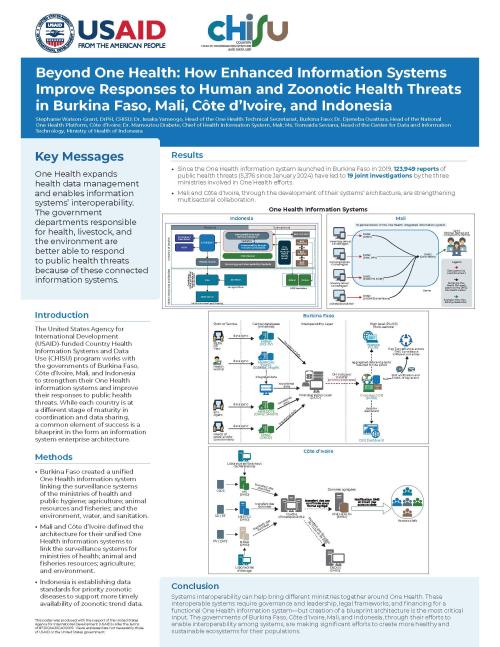Burkina Faso
CHISU is working to strengthen Burkina Faso’s HIS by supporting the following areas:
- The One Health approach
- Malaria data quality and use
- COVID-19 data quality, availability, and use
- Routine HIS (including data quality and use and DHIS2 scale up at the health facility level)
Supporting One Health information system strengthening
The One Health approach calls for a comprehensive vision of disease surveillance, considering human, animal, and environmental factors. CHISU supports national and decentralized coordination bodies; supports data exchange through multiple databases and an interoperability layer; and builds staff’s skills across several levels of the health system for multiple ministries. CHISU is working to strengthen the One Health HIS in the four regions already covered by USAID in previous years (Center South, Plateau Central, Boucle du Mouhoun, and Center West) and extend it to an additional region (Center East). CHISU will further improve the analysis and use of routine and aggregate health surveillance data from the three One Health ministries and assist these ministries to respond to public health events in Burkina Faso.
Supporting U.S. President’s Malaria Initiative (PMI) activities
PMI, through CHISU, is providing technical and financial support to Burkina Faso’s National Malaria Control Program (PNLP) at the regional level to strengthen the quality and use of data. CHISU is facilitating identification of barriers and possible solutions to quality surveillance data with malaria stakeholders; supporting the development of a surveillance improvement plan for operating units; supportive supervision of intermediate- and health facility-level actors on the collection, analysis, and use of quality data; conducting district data validation and review sessions with district and health facility staff; and following up on completion of tasks listed in problem-solving plans at the district level.
Revising COVID-19 data system design analysis and immunization tool
CHISU is working to increase the quality, demand, and use of COVID-19 data, which is collected in the country’s “MS-Surveillance” data management tool. CHISU is providing a thorough analysis of the country’s data collection systems, as well as mapping the people, systems, and processes of the systems that need to be digitized. CHISU is also focusing on the revision of the country’s COVID-19 vaccination tools by simplifying the individual data collection form and creating an aggregated data collection form.
Strengthening availability and use of COVID-19 data
COVID-19 data has improved in Burkina Faso, but there are still ongoing issues with incomplete data and delays with entering data at the site level. CHISU is ensuring importation of available aggregated COVID-19 immunization data while continuing to support retrospective data entry of COVID-19 vaccination register data. This will enable advanced data analytics and data triangulation of COVID-19 vaccination data. In addition, CHISU supported work to make MS-Surveillance interoperable with the country’s COVID Info application—enabling rapid COVID-19 test result availability to the public and the generation of vaccination cards.
Strengthening use of ENDOS
CHISU is working with Burkina Faso’s Ministry of Health and Public Hygiene to extend data entry in ENDOS (Burkina Faso’s routine HIS) in health facilities in the two CHISU-supported regions. Previously, CHISU cleaned the ENDOS database, and currently the program is working to extend the use of data quality review, assist with developing a Master Facility List, and implement ENDOS interoperability with other data management systems. CHISU is also extending the use of the data quality review (DQR) package tool for desk review, and has participated in the exchanges on implementing interoperability between the tuberculosis (TB) tracker and ENDOS with the technical support of health information systems programs (HISP). Additionally, CHISU (in collaboration with the World Health Organization and Cooper Smith) is technically supporting the Ministry of Health Information Technology Directorate (DSIS) in finalizing the interoperability architecture.

Activity Updates
Advancing Global Health Security in Burkina Faso through shared One Health data

CHISU is partnering with multiple government ministries in Burkina Faso to improve coordination and rapid response to emerging public health threats through shared data. Read more ›
Blog Posts
Collecting and using health information is an important part of health workers’ jobs. While we have made great strides in moving from paper-based records to digital health information systems, data that both health workers and policy makers need is often scattered across multiple information systems that cannot “talk” to each other. This means that health workers have to spend more time entering and finding data in multiple places and results in an incomplete view of both patient and community health. Read more ›
News
Using Stages of Continuous Improvement (SOCI) assessments to measure Burkina Faso's HIS progression
Health Information System (HIS) Stages of Continuous Improvement (SOCI) assessments show progression in Burkina Faso's health information system and areas to focus on to accelerate the country's digital transformation. Read more ›
Resources

Community-Based One Health Disease Surveillance and Notification in Burkina Faso
CHISU presented this poster on our community-based one health work in Burkina Faso at the World One Health Congress in September 2024. Read more about CHISU @ World One Health Congress.

CHISU presented this poster on our one health work in Burkina Faso, Mali, Côte d’Ivoire, and Indonesia at the World One Health Congress in September 2024.